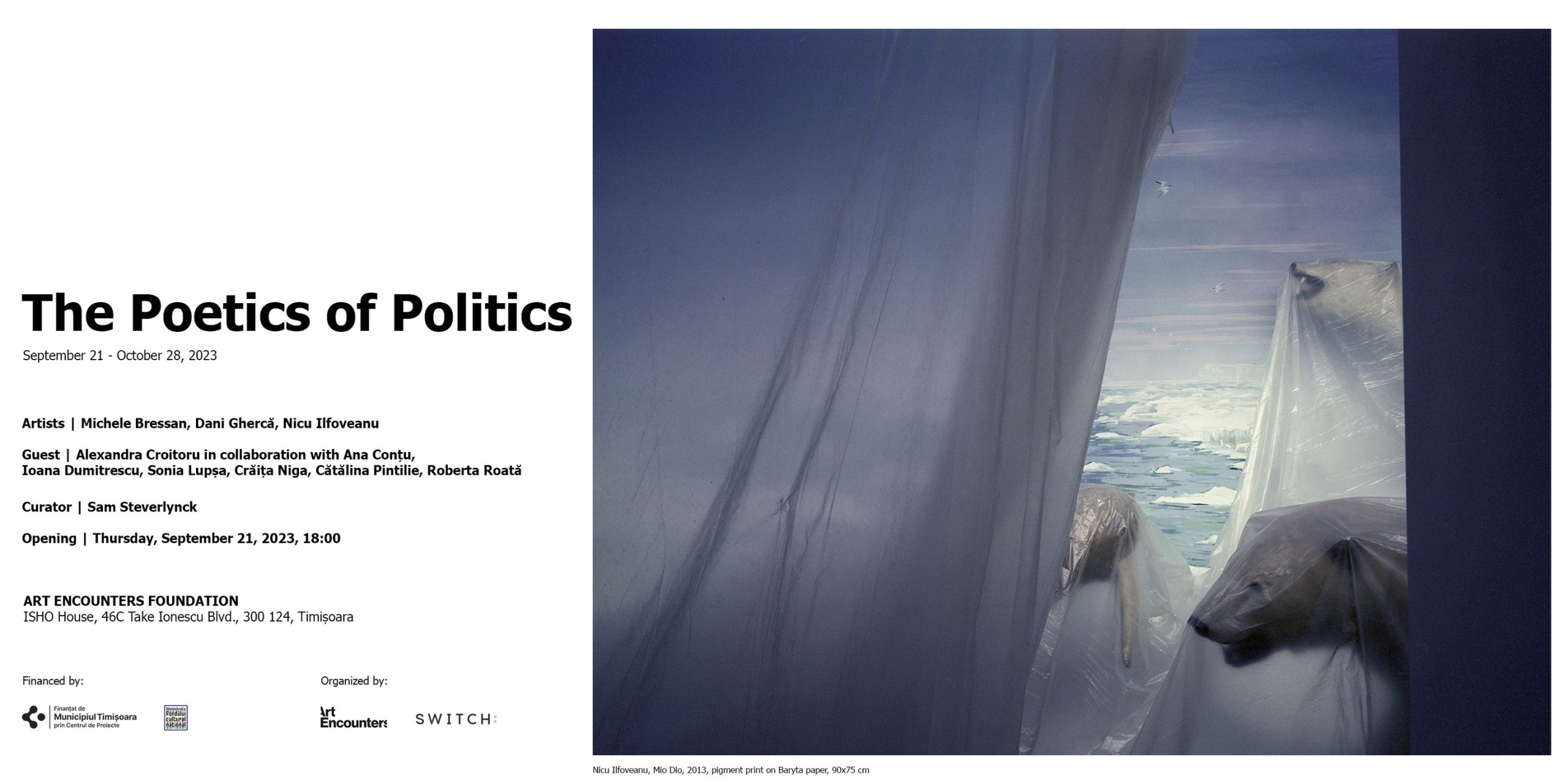
Artiști: Michele Bressan, Dani Ghercă, Nicu Ilfoveanu
Cu participarea artiștilor: Alexandra Croitoru în colaborare cu Ana Conțu, Ioana Dumitrescu, Sonia Lupșa, Crăița Niga, Cătălina Pintilie, Roberta Roată.
Curator: Sam Steverlynck
Perioada expoziției: 21 Septembrie – 28 Octombrie, 2023.
The Art Encounters Foundation invites you to the opening of the photography exhibition “The Poetics of Politics” by artists Michele Bressan, Dani Ghercă, Nicu Ilfoveanu, and the invited artist, Alexandra Croitoru, who will present a series of works in collaboration with Ana Conțu, Ioana Dumitrescu, Sonia Lupșa, Crăița Niga, Cătălina Pintilie, Roberta Roată; which will take place on Thursday, September 21, from 18:00, at the permanent headquarters of the Foundation, Blvd. Take Ionescu 46C (Casa ISHO, 1st floor), Timișoara.
Curated by Belgian art critic and curator Sam Steverlynck, this project was conceived as an exhibition diptych held at Harlan Levey Projects in Brussels (June 10 – July 15, 2023) and the Art Encounters Foundation in Timișoara (September 21 – October 28, 2023), within the framework of Timișoara 2023 – European Capital of Culture.
Whereas the exhibition at Harlan Levey Projects focused on the shift from communism to a market economy – which was an essential subject for an entire generation of artists from the beginning of the 1990s onwards – the
exhibition at the Art Encounters will expand this topic by reflecting on the oscillation between the ruins of the past and possibilities for the present, both from a personal and a political perspective.
Thus, the Timișoara exhibition brings together the works of an emerging generation of Romanian photographers (Michele Bressan; guest artist Alexandra Croitoru; Dani Ghercă; Nicu Ilfoveanu) who graduated from the Academy of Arts in Bucharest, where many of them also teach. Growing up after the 1989 Revolution and experiencing firsthand the sudden transition from communism to capitalism, as well as its long-lasting social, political, economic, and urban effects, what unites their practice is a cautious approach toward the use of imagery for various narratives and a meta-reflexive way of dealing with the medium photography. Adhering to a conceptual approach instead of a documentary one, they reflect on a period of economic, social, and technological transition, examining the notion of the image in all its forms.
Experimenting with different presentation modes, switching between analog and digital, projected image and moving image, while sometimes also incorporating found footage and text, they want to overcome the limitations of the still image while stretching its possibilities. Though they do not proclaim themselves as outspoken in political terms, their way of looking at society bears a political dimension expressed through a visual language that is experimental, aesthetic, and poetic.
The exhibition hosted by the Art Encounters Foundation can be visited from Tuesday to Saturday between 12:00 and 18:00, offering a guided tour every Saturday from 17:00.
Free access. Thank you, and we welcome you to join us!
Blvd. Take Ionescu 46C, Timișoara.
Dani Ghercă (b. 1988) lives and works in Bucharest, Romania. Ghercă’s work reflects on the current transition to a new phase of human consciousness and the impact of technology on our sense of self, relationship with others, and environment. His work explores the relationship between urbanization and the human experience. He uses photography to examine the notion of urbanity, scale, and disconnection. In his photographic quest, he aims to transmit a feeling of confusion, awe, and claustrophobia to the viewer.
Nicu Ilfoveanu (b. 1975) lives and works in Bucharest, Romania. Active in the field of photography, film, and photo books, Nicu Ilfoveanu is credited with a particular position in Romanian contemporary arts. He graduated from the National University of Arts Bucharest, where he is currently teaching photography. His work is characterized by an unexpected and unpredictable interplay between personal and documentary, sublime and trivial, and evidence and hidden subjects.
Michele Bressan (b. 1980) is a visual artist working with photography and film, based in Bucharest since 1993. His work focuses on documenting aspects of the Romanian post-communist reality, using the photographic medium as a means of artistic research. By the practice of portraying his surroundings through series having the typology of a subjective journal, or by a more distant approach, he offers a comment and at the same time, the possibility to relate to a scene, witnessing the particularities and mechanisms of a society in a slow transition process.
Alexandra Croitoru (b. 1975) is a visual artist and curator, currently teaching at the Photo-Video department of The National University of Arts Bucharest. Together with students and alumni of the UNArte Photo-Video department, Ana Conțu, Ioana Dumitrescu, Sonia Lupșa, Crăița Niga, Cătălina Pintilie and Roberta Roată, she made a series of black and white portraits, mimicking the body language and attributes of the male-dominated history of portraiture. By posing with precarious ‘armors’ made from ordinary domestic objects, they not only deconstruct the language of power of this classical genre but also inject it with a sense of playfulness and feminism. The pictures are printed on textiles, often associated with domesticity and femineity. Titled Ways to Protect Your Mind, Body and Spirit (2023), the series also refers to vulnerability and resilience in a post-pandemic world. By appropriating a visual language from the past, the artists want to propose a future based on collectivity and participation.
—
The exhibition is organized by the Art Encounters Foundation and SwitchLab and is co-financed by the Municipality of Timișoara through the Center for Projects and AFCN.
*The project is part of the national cultural program “Timișoara – European Capital of Culture in 2023” and is financed by the European Echoes program, run by the Municipality of Timișoara through the Center for Projects, with amounts allocated from the state budget, through the budget of the Ministry of Culture.
**The project does not necessarily represent the Administration of the National Cultural Fund’s position. AFCN is not responsible for the project’s content or how the project results may be used. These are entirely the responsibility of the beneficiary of the funding.
